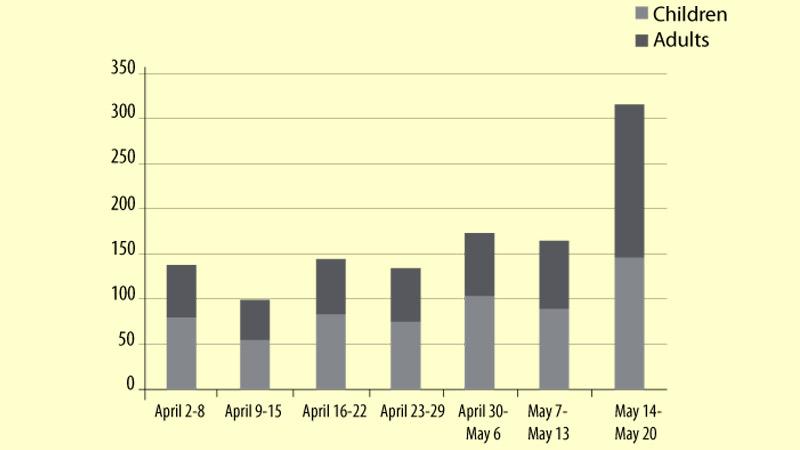
The influenza/Adenovirus that had claimed a number of lives, mostly children and resulted in the closure of schools in the Southern Province now seems to have been controlled by the health officials.
According to the Director of the Karapitiya Teaching Hospital Dr Jayampathi Senanayake, swift treatment and the availability of tests and other amenities have helped in controlling the situation.
“The numbers affected by the virus is now decreasing. This is a virus which is a combination of influenza and adenoviruses. The most vulnerable group is children below 2 years, pregnant mothers and the elderly,” Dr Senanayake said.
Statistics show that the number of patients admitted to the District General Hospital Matara with symptoms of upper respiratory tract infection had almost doubled in the past week as compared to the figures in the preceding week.
A total of 313 patients (145 children and 168 adults) diagnosed with upper respiratory tract infection were admitted to the District General Hospital Matara, in the period May 14 to 20, while only 164 patients (89 children and 75 adults) were admitted in the period, May 7 to 13.
According to the World Health Organization (WHO) Seasonal influenza viruses can cause mild to severe illness and even death, particularly in some high-risk individuals.
Persons at increased risk for severe disease include pregnant women, the very young and very old, immune-compromised people, and people with chronic underlying medical conditions such as cancer, diabetes mellitus and heart diseases. Seasonal influenza viruses evolve continuously, which means that people can get infected multiple times throughout their lives.
Sources at the DGH Matara confirmed this and said that patients diagnosed with upper respiratory tract infection are admitted to the hospital throughout the year while there is a sharp increase at this time of the year as the climatic conditions become ideal for the virus to spread. It was stated that the unusually sharp increase within the past week was a matter of concern.
According to a report issued by the World Health Organisation (WHO) the current season, is prone to severe disease. “This seasonal A (H1N1) virus is the same virus that caused the influenza pandemic and it first appeared in Sri Lanka in two waves during the 2009/ 10 period,” the report read.
Ten to 15 samples of nasopharyngeal aspirates obtained from patients diagnosed with upper respiratory tract infections warded at the DGH Matara are sent to the Medical Research Institute (MRI) for testing each month. Of the 15 samples submitted in April only one patient tested positive for Influenza type ‘A’ virus while in the month of May 5 of the 39 samples submitted have tested positive.
Two deaths of persons suffering from respiratory tract infection have been recorded at the DGH Matara in the months of April and May. One was a 26 year old female who was pregnant while the other was a 59 year old male. Although samples obtained from the deceased had been submitted to the MRI the authorities have not received the results yet.
The hospital authorities in Matara have taken all measures to stop the disease spreading and may even restrict the number of visitors to two per patient as a precaution.
According to the Director General of Health Services, facilities were strengthened for optimal management of patients, in light of these circumstances.
Authorities further encouraged the public to take personal hygienic measures to prevent the spread of respiratory infections, such as, covering the mouth and nose with a tissue/handkerchief while sneezing and coughing when having flu, washing hands with soap and water frequently, avoiding touching face, avoiding overcrowded public places, especially when infected with the flu’ and seeking medical attention if in a high risk group.
